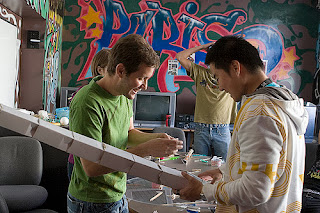 |
| Sam Piha |
 In August of 2013, author Hilary Levey Friedman published her new book entitled Playing to Win: Raising Children in a Competitive Culture. In her book and subsequent article in the November issue of The Atlantic, Ms. Friedman contends that parents send their children to competitive afterschool programs to gain advantages that they can utilize when they enter the workforce. In interviewing middle-class and affluent parents, she learned that there are five skills that parents hope their kids will acquire, which she calls "Competitive Kid Capital".
In August of 2013, author Hilary Levey Friedman published her new book entitled Playing to Win: Raising Children in a Competitive Culture. In her book and subsequent article in the November issue of The Atlantic, Ms. Friedman contends that parents send their children to competitive afterschool programs to gain advantages that they can utilize when they enter the workforce. In interviewing middle-class and affluent parents, she learned that there are five skills that parents hope their kids will acquire, which she calls "Competitive Kid Capital". - "The importance of winning: Friedman writes, 'Such an attitude prepares children for winner-take-all settings like the school system and lucrative labor markets.'
- Learning from loss: This teaches kids perseverance and focus—traits that are valuable as children move through life if they want to work toward successful outcomes.
- Time management: 'Children need to learn how to manage their own schedules,' writes Friedman, 'something they may have to do some day as busy consultants and CEOs.'
- Adaptability: Participation in competitive out-of-school activities teaches children how to perform and compete in environments that require adaptation, such as taking the SAT, the LSAT or the bar exam, according to Friedman.
- Grace under pressure: For example, the grace a student learns to maintain when performing in a ballet recital will serve that student well when interviewing for a job."(1)
Are these skills truly important for young people's success? Can we teach them in afterschool and summer programs that include kids from all economic backgrounds? Or are they skills that can only be acquired in "pay-to-play" afterschool programs?
We contacted Hilary Levey Friedman to ask about the history of competitive activities in afterschool programs and issues regarding their accessibility. She was very gracious in answering our questions, some of which is cited below.
 |
| Hilary Levey Friedman |
Q: You write about the intentions of middle to upper class parents regarding competitive afterschool youth programs. Did you find some programs that were more diverse in the participants?
A: Dance parents that I interviewed offered the most diversity, with several working class families. They valued the same skill set of competitive kid capital, but they did not know how to leverage it as well in terms of college admissions. I like to say that ALL parents want what is best for their kids, and they make choices based on what is available and realistic for their families. I write more about this issue here, which I think is helpful to highlight.
Q: Can you comment on the differences between free and "pay-to-play" afterschool programs?
A: ALL afterschool programs offer invaluable skill development and life lessons. But not all free programs are able to offer the same level of developed, organized competition. Chess provides one way to do this, as it costs less than, say, soccer or other sports activities. Services by community non-profits are incredibly important for other reasons (like giving kids a safe space in the afterschool hours), but they can't always fill the competitive void-- even though historically this is where competitive afterschool activities come from, as I detail in Chapter 1 of the book. If you don't have the book the full chapter is available for download on UC Press' website.
Q: This was not always true historically. Can you speak to this?
A: About a hundred years ago, it would have been the lower-class children competing under nonparental adult supervision while their upper-class counterparts participated in noncompetitive activities, often in their homes. Children’s tournaments, especially athletic ones, came first to poor children—often immigrants—living in big cities.
With the simultaneous rise of mandatory schooling and laws restricting child labor, worry mounted over the idle hours of children, which many assumed would be filled with delinquent or self-destructive activities. Urban reformers were particularly preoccupied with poor immigrant boys who, because of overcrowding in tenements, were often on the streets.
Reformers’ focus was less on age-specific activities and more generally on “removing urban children from city streets.” Initial efforts focused on the establishment of parks and playgrounds, and powerful, organized playground movements developed in New York City and Boston. But because adults “did not trust city boys to play unsupervised,” attention soon shifted to organized sports.
By the 1930s this pattern began to shift as a consequence of the Great Depression and as educational philosophies changed. During the Depression many clubs with competitive leagues suffered financially and had to close, so poorer children from urban areas began to lose sites for competitive athletic contests organized by adults. Fee-based groups, such as the YMCA, began to fill the void, but usually only middle-class kids could afford to participate.
_____________________
Dr. Levey Friedman matriculated at Princeton University, from which she earned a PhD in Sociology in 2009 as both a Spencer Dissertation Fellow and as a Harold W. Dodds fellow. During graduate school her research focused on competitive after-school activities (chess, dance, Kumon enrichment classes, and soccer), children’s work, and university commencement speakers. Dr. Levey Friedman recently completed a post-doctoral fellowship at Harvard University quantitatively studying youth sports injuries, supported by the Robert Wood Johnson Foundation.














